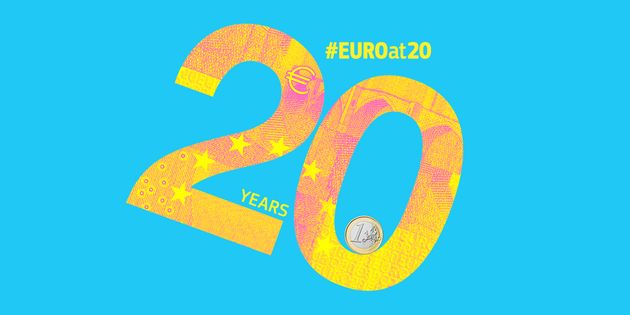Over 340 million Europeans in 19 countries use the currency today. The creation of a digital euro is among the challenges ahead, which could have “far-reaching implications for societies in the future”, says a Christian analyst.
![The ECB opened the celebrations of the 20th anniversary with a light show at its headquarters./ [link]ECB[/link], CC0.](https://cms.evangelicalfocus.com/upload/imagenes/61ebfb43401e0_ECBanni940.jpg) The ECB opened the celebrations of the 20th anniversary with a light show at its headquarters./ [link]ECB[/link], CC0.
The ECB opened the celebrations of the 20th anniversary with a light show at its headquarters./ [link]ECB[/link], CC0.
Two decades ago, on 1 January 2002, the first euro coins and banknotes were put into circulation in 12 European countries, replacing their national currencies.
Three years earlier, the first 11 countries had fixed their exchange rates, adopted a shared monetary policy under the European Central Bank (ECB), and launched their new common currency on world financial markets.
Then, the euro aimed “to make life simpler, using the same currency for work and business throughout the Euro area and for travel and living abroad”, according to the ECB.
The name ‘euro’ was agreed at the 1995 European Council meeting in Madrid, as part of the preparations for the single currency; while the euro symbol was inspired by the Greek letter epsilon, “a reference to the cradle of European civilisation”.
It also “stands for the first letter of the word ‘Europe’ in the Latin alphabet, and the two parallel lines running through the symbol signify stability”.
The European Central Bank opened the celebrations of the 20th anniversary with a light show at its headquarters. The building in Frankfurt was lit up at midnight on 1 January, and remained illuminated every night until 9 January .
Twenty years later, the euro is shared by over 340 million Europeans in 19 countries, and it has become the world’s second most important currency after the US dollar for international payments, borrowing, lending and central bank reserves.
Furthermore, 60 countries and territories outside the euro area, representing 175 million people, have linked their own currencies to the euro either directly or indirectly.
The EU Member States which have not adopted the euro yet (Bulgaria, Croatia, the Czech Republic,Hungary, Poland, Romania, and Sweden), except Denmark, that is excluded under a special arrangement, are required to adopt it and join the euro area, as soon as they meet certain conditions known as 'convergence criteria'.

Halfway through its second decade of history, the euro faced a debt crisis that began in Greece and spread to other nations.
In July 2015, Greece's debt crisis worsened when former Greek Prime Minister, Alex Tsipras, decided to shut banks and restrict cash withdrawals, after the European Central Bank resolved not to extend emergency funding.
Tsipras called a referendum on the EU bailout. Some Greek institutions, including the Greek Evangelical Alliance (GEA), stressed the importance of staying in the Eurozone.
“Greece's participation in the European institutions has so far been a real help and an agent for the promotion of religious liberties in our country”, pointed out the Greek evangelical group, although “small evangelical community in Greece does not take sides in political matters, as this could bring about divisions in the body of Christ”.
Despite the result of the referendum against the bailout, the Greek government reached an agreement on 13 July 2015 with the EU authorities for a three-year-bailout with even harsher austerity conditions than the ones already rejected by voters.
Apart from Greece, bailouts were given to Ireland, Portugal, Spain and Cyprus, so that they could stay in the Eurozone. Austerity measures were imposed on these economies in return.
According to Christian economist and former director of Jubilee Centre, Jonathan Tame, “the crisis in the Euro around 2012-13 pushed unemployment very high back then, and the recovery has been quite uneven. Some countries are back to very high levels of employment, but in the south (Spain, Italy, Greece…) unemployment levels have remained really stubbornly high, especially for young people”.
Last December, the ECB announced a redesign of the notes, which is likely to happen in 2024. “After 20 years, it's time to review the look of our banknotes to make them more relatable to Europeans of all ages and backgrounds”', ECB President Christine Lagarde said in a statement.
But the biggest project the European Commission and the European Central Bank are currently investigating is whether to create a digital euro.
“A digital form of central bank money would offer greater choice to consumers and businesses. Given its potential as an innovative and safe means of payment, a digital euro could support the EU’s digital transition with possibly new financial services and also increase the international role of the euro”, underlined the ECB.
However, Christian economist and Jubilee Centre researcher, Paul Mills, warns in an article that “Central Bank Digital Currencies (CBDCs) represent an enormous threat to privacy and monetary integrity”.
“Any benefits from CBDCs are far outweighed by the danger of their facilitation of tyranny over the population, as we are seeing with China’s ‘social credit’ system, which is being combined with their digital renminbi”, adds Mills.

[photo_footer] The European Commission and the ECB are currently investigating whether to create a digital euro../ ECB. [/photo_footer]
Furthermore, Paschal Donohoe, President of the Eurogroup and Finance Minister of Ireland, told news website Euronews that “something that is a challenge for the euro area, and therefore it really matters to the euro, is how we can have a recovery, which benefits young people, and is inclusive and fairer as women come back into the workforce and new work patterns begin to establish themselves".
Regarding the effects of the pandemic, Donohoe pointed out that “if you look now at the speed with which the euro area has recovered from the Ccovid-19 crisis, the speed of recovery is around four times quicker than it was in the global financial crisis”.
Looking at this uncertain and challenging future, Mills calls on believers to “pray for wisdom for elected leaders and central bankers. These are complex issues with far-reaching implications for societies in the future”.

Las opiniones vertidas por nuestros colaboradores se realizan a nivel personal, pudiendo coincidir o no con la postura de la dirección de Protestante Digital.
Si quieres comentar o